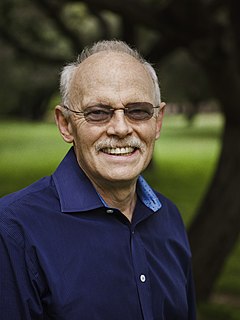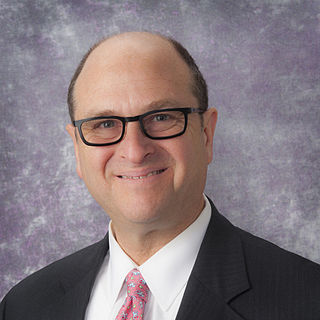
James Lloyd "Jay" McClelland, FBA is the Lucie Stern Professor at Stanford University, where he was formerly the chair of the Psychology Department. He is best known for his work on statistical learning and Parallel Distributed Processing, applying connectionist models to explain cognitive phenomena such as spoken word recognition and visual word recognition. McClelland is to a large extent responsible for the large increase in scientific interest for connectionism in the 1980s.
Paul Montgomery Churchland is a Canadian philosopher known for his studies in neurophilosophy and the philosophy of mind. After earning a Ph.D. from the University of Pittsburgh under Wilfrid Sellars (1969), Churchland rose to the rank of full professor at the University of Manitoba before accepting the Valtz Family Endowed Chair in Philosophy at the University of California, San Diego (UCSD) and a joint appointments in that institution's Institute for Neural Computation and on its Cognitive Science Faculty.

Philip E. Rubin is an American cognitive scientist, technologist, and science administrator. He is known for his pioneering development of articulatory synthesis, and sinewave synthesis, and their use in studying complex temporal events, including understanding the biological bases of speech and language. He is the Chief Executive Officer emeritus and a member of the Board of Directors of Haskins Laboratories in New Haven, Connecticut, where he was also a senior scientist. In addition, he is a Professor Adjunct in the Department of Surgery, Otolaryngology at the Yale University School of Medicine, a Research Affiliate in the Department of Psychology at Yale University, a Fellow at Yale's Trumbull College, and a Trustee of the University of Connecticut. From 2012 through Feb. 2015 he was the Principal Assistant Director for Science at the Office of Science and Technology Policy (OSTP) in the Executive Office of the President of the United States, and led the White House's neuroscience initiative. He also served as the Assistant Director for Social, Behavioral and Economic Sciences at OSTP. For many years he has been involved with issues of science advocacy, education, funding, and policy.
Fernando Nottebohm is a neuroscientist and is the Dorothea L. Leonhardt Professor at Rockefeller University as well as being head of the Laboratory of Animal Behavior and director of the Field Research Center for Ecology and Ethology.
John Anthony Hardy FRS is a human geneticist and molecular biologist at the Reta Lila Weston Institute of Neurological Studies at University College London with research interests in neurological diseases.
Helen J. Neville was an internationally renowned psychologist and neuroscientist. Neville was the Robert and Beverly Lewis Endowed Chair and Professor of Psychology and Neuroscience, Director of the Brain Development Lab, and Director of the Center for Cognitive Neuroscience at the University of Oregon.
Peter John Stang is a German American chemist and Distinguished Professor of chemistry at the University of Utah. He has been the editor of the Journal of the American Chemical Society since 2002.
Carol A. Barnes is a neuroscientist and a Regents' Professor of psychology at the University of Arizona. Since 2006, she has been the Evelyn F. McKnight Chair for Learning and Memory in Aging and is director of the Evelyn F. McKnight Brain Institute. Barnes has been president of the Society for Neuroscience and is a Fellow of the American Association for the Advancement of Science, and foreign member of the Royal Norwegian Society of Sciences and Letters. She was elected to the National Academy of Sciences in 2018.

Joel S. Schuman is an American ophthalmologist, specialising in glaucoma. In 2016 he was appointed Director of NYU Langone Eye Center and Professor and Chairman of Ophthalmology at NYU Langone Medical Center, NYU School of Medicine, and Professor of Biomedical, Electrical and Computer Engineering at NYU Tandon School of Engineering. In 2016 he was also appointed Professor of Neuroscience and Physiology and a member of the Neuroscience Institute, at NYU Langone Medical Center, NYU School of Medicine. In 2017 he became Professor of Neural Science in the Center for Neural Science at NYU. From 2003 - 2016 he was the Professor and Chairman of Ophthalmology at the Eye and Ear Institute, University of Pittsburgh School of Medicine, the Eye and Ear Foundation Endowed Chair and Director of the University of Pittsburgh Medical Center (UPMC) Eye Center. He was also Professor of Bioengineering at the Swanson School of Engineering, University of Pittsburgh and Director of the Louis J. Fox Center for Vision Restoration of UPMC and the University of Pittsburgh. He was a member of the McGowan Institute for Regenerative Medicine and the Center for the Neural Basis of Cognition, Carnegie Mellon University and University of Pittsburgh. He became a Distinguished Professor of Ophthalmology at the University of Pittsburgh in September 2014.

The Virginia Tech Carilion School of Medicine is a medical school associated with the Fralin Biomedical Research Institute at VTC, a university-level research institute of Virginia Tech. It was formed as a public-private partnership with the Carilion Clinic, with the medical school and the research institute located in Roanoke, Virginia. The medical school grants the Doctor of Medicine (M.D.), degrees to its graduates.
Peter D. Hislop is an American mathematician, formerly the Ralph E. and Norma L. Edwards Research Professor and University Research Professor (2004–2005), at the University of Kentucky, and also a published author.
Matthew S. Sigman is an American chemist, focusing in Organic Synthesis & Asymmetric Catalysis, currently the Peter J. Christine S. Stang Presidential Endowed Chair and Distinguished Honors Professor at University of Utah and a Fellow of the American Association for the Advancement of Science and.
Robert E. Marc is an American ophthalmologist, currently Distinguished Professor, and previously Calvin & JeNeal Hatch Endowed Chair in Ophthalmology and Mary H. Boesche Professor at University of Utah and previously the Robert Greer of Neural Sciences at University of Texas Health Science Center at Houston. He is a Fellow of the American Association for the Advancement of Science, Society for Neuroscience and Association for Research in Vision and Ophthalmology.
Mark Jay Shlomchik is an American immunologist currently UPMC Endowed Professor and Chair at University of Pittsburgh.
Chester Mathis is an American biologist who is currently the Distinguished Professor of Radiology at University of Pittsburgh and formerly holding the UPMC Endowed Chair of PET Research.
Victoria Pitts-Taylor is Professor of Feminist, Gender, and Sexuality Studies at Wesleyan University, Connecticut, and also Professor of Science in Society and Sociology there. She was formerly a professor of sociology at Queens College and the CUNY Graduate Center, New York, and visiting fellow at the Centre for the Study of Social Difference, Columbia University, New York. Pitts-Taylor is also former co-editor of the journal Women's Studies Quarterly. She has won the Robert K. Merton Book Award from the section on Science, Knowledge and Technology of the American Sociological Association, and the Feminist Philosophy of Science Prize from the Women's Caucus of the Philosophy of Science Association.
Julie A. Fiez is a cognitive neuroscientist known for her research on the neural basis of speech, language, reading, working memory, and learning in healthy and patient populations. She is Professor of Psychology and Neuroscience at the Learning Research and Development Center and the Center for the Neural Basis of Cognition at the University of Pittsburgh. She is also Adjunct Faculty in the Department of Psychology at Carnegie Mellon University.
Eric Manvers Shooter M.A., Sc.D., D.Sc., F.R.S. was an English scientist known for investigating the biochemistry of nerve growth factor (NGF). From 1961 onwards he was affiliated with Stanford University School of Medicine, where he was founding chairman of the Department of Neurobiology (1975-1987).






